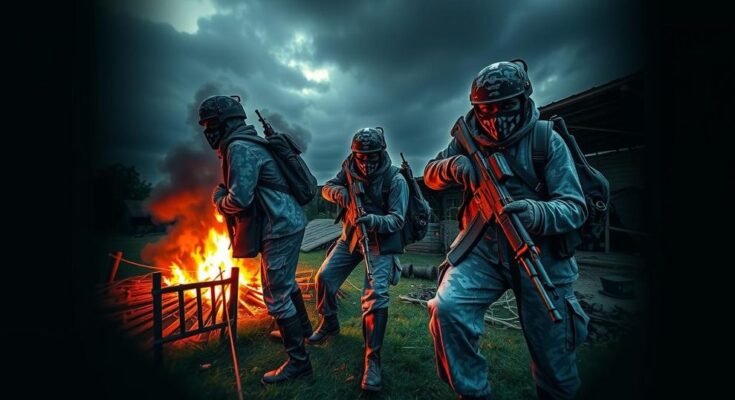Fifteen people were killed in an attack on the village of Mera in northwest Nigeria by a newly emerged jihadist group named Lakurawa, which has reportedly crossed from Mali and Niger. The assault took place during Friday prayers, highlighting the vulnerability of local communities. The region continues to face severe unrest linked to broader Islamist insurgency efforts and armed banditry, contributing to a humanitarian crisis characterized by acute food insecurity.
A violent attack in the northwest Nigerian village of Mera has resulted in the deaths of 15 individuals, as confirmed by local authorities on Saturday. The assault, attributed to unidentified gunmen, is speculated to be linked to a newly emerged jihadist group called Lakurawa, which reportedly crossed into Nigeria from neighboring Mali and Niger. This incident highlights the escalating turmoil in the region, with officials noting the group’s incursion and their sophisticated weaponry utilized against the villagers during a period when many were attending mosque services for Friday prayers. The Kebbi State deputy governor, Umar Tafida, along with high-ranking security personnel, participated in the mournful funeral rites for the victims. The recent violence underlines a broader crisis that has plagued Nigeria since the emergence of Boko Haram in 2009, leading to numerous splinter factions and groups exploiting the unrest. These factions are involved in various criminal activities, including mass kidnappings and widespread chaos, which have compounded the existing humanitarian crises, with projections indicating that 33 million people may experience acute food insecurity by next year due to the ongoing violence. Deputy governor Idris Muhammad Gobir of Sokoto State informed federal military officials about the presence of the Lakurawa group, underscoring the seriousness of the threat. The group, which has established a foothold near the Niger border, reportedly engages in violent incursions, rustling livestock, and imposing a harsh interpretation of sharia law on local communities. In a disturbing trend, the group is known to recruit local youth by providing financial inducements to invest in trades, thereby promoting local allegiance to their cause. In the most recent attack, villagers attempted to resist the armed assailants, who demonstrated overwhelming firepower, resulting in considerable loss of life and property. Local leaders have expressed their determination to protect their communities, yet the growing sophistication of these jihadist groups poses a significant challenge.
The situation in Nigeria’s northwest region has deteriorated due to the emergence of various armed groups, particularly jihadist factions that have been linked to the wider Islamist insurgency in the country. Since the rise of Boko Haram in 2009, numerous splinter groups have formed, complicating efforts to maintain security. Reports of armed bands and clashes between farmers and nomadic herdsmen further exacerbate the chaos, creating a fertile ground for groups like Lakurawa to gain traction and exploit the vulnerabilities of local populations. The humanitarian implications of this unrest are severe, with escalating violence contributing to food insecurity and a significant increase in the number of people requiring assistance from humanitarian agencies.
The recent attack in Mera, resulting in the tragic death of 15 villagers, symbolizes the alarming surge of violence linked to the newly established Lakurawa jihadist group in Nigeria. This incident highlights the growing complexities of the security situation in the northwest, driven by the intersection of various armed factions and long-standing grievances within communities. As the threat posed by Lakurawa and similar groups persists, the need for robust security measures and community resilience becomes crucial in safeguarding the lives and livelihoods of local populations. The international community must also be alerted to the humanitarian crisis unfolding as a consequence of such violence.
Original Source: thedefensepost.com




